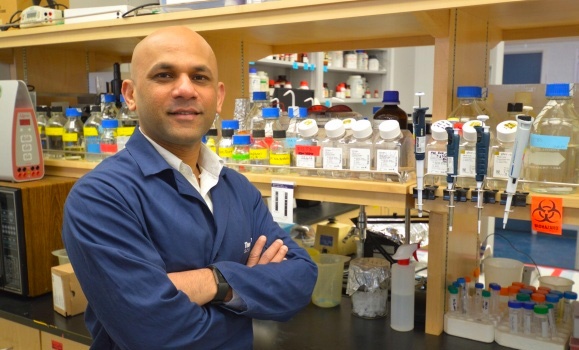A Dalhousie Medical School cancer immunologist has received a rare five-year operating grant from the U.S. NIH’s National Cancer Institute, in the amount of $3.2 million (Cdn).
“The success rate for this competition is often around 10 to 12 per cent,” says Dr. Shashi Gujar, an assistant professor in the Department of Pathology with a background in biotechnology and drug development. “So of course, we are ecstatic.”
Dr. Gujar is working with American-Canadian chemist Dr. Sherri McFarland, a professor at the University of North Carolina (and adjunct faculty member at Dalhousie and Acadia) on the NIH-funded project to develop new immunotherapies for advanced melanoma, the deadliest form of skin cancer.
The researchers have created photo-sensitive ruthenium metal-based compounds that can be applied to melanoma lesions on the skin. When activated by a specific wavelength of light, these compounds kill melanoma cells and, in the process, “teach” the immune system to recognize and eliminate metastatic cancer cells circulating in the body.
The idea is similar to a vaccine. “Once the immune system learns to target cancer on its own, it can establish long-term, cancer-free health — even after discontinuation of the therapy,” Dr. Gujar explains.
The nature of melanoma
Melanoma is an “immunogenic” cancer, meaning that our immune system can be “trained” to identify and eliminate this cancer. If melanoma is discovered and diagnosed early, it can be cured by the surgical removal of the lesion, which often begins as a mole. When it spreads beyond the initial lesion, however, melanoma is hard to target and kill. “Right now, the survival rate for advanced melanoma is less than five percent,” says Dr. Gujar, adding that this cancer affects more men than women.
Advanced melanoma is most often treated with radiation and chemotherapy. But, as Dr. Gujar explains, “These currently available options are inadequate. Hence, we are developing a new class of cancer immunotherapies that train the immune system against melanoma.”
The role of ruthenium
Ruthenium, a rare elemental metal with unique chemical properties, can be used to build safe treatments that “are light-activatable and immunotherapeutic.” Phototherapy using light-sensitive ruthenium compounds is proving to induce an anti-tumour immune response in laboratory studies which Dr. Gujar describes as “amazing.”
Since the ruthenium compounds are only active in the presence of a particular frequency of light and at “really, really low concentrations,” he says their side effects, if any, will be minimal.
Dr. Gujar hopes the treatments he and Dr. McFarland are developing for melanoma will be ready for clinical trials within five years. Ruthenium compounds developed by Dr. McFarland for bladder cancer are already being tested in clinical trials.
A chance meeting
Dr. Gujar met Dr. McFarland four years ago, through mutual connections at Halifax’s Beatrice Hunter Cancer Research Institute (BHCRI). In a talk at Dalhousie, Dr. McFarland shared her intriguing finding that phototherapy-treated mice became immune to subsequent tumour challenges. Dr. Gujar immediately connected with her and said, “We need to look into this thing.”
The two are now working with Halifax melanoma surgeon and Dalhousie professor, Dr. Steven F. Morris, and University of Houston professor, Dr. Randolph Thummel.
Pre-clinical testing of the ruthenium compounds will happen at Dalhousie in Dr. Gujar’s laboratory.
“This landmark initiative will open doors for so many big opportunities,” says Dr. Gujar, adding that this internationally competitive and cutting-edge research is only possible due to “indispensable support” from the BHCRI, Dalhousie Medical Research Foundation (DMRF) and Dalhousie Medical School Department of Pathology.
An immunologist on a hunt for a cure
Dr. Gujar began his career as a veterinarian. After receiving a masters degree in biotechnology, he completed doctoral studies in immunology and infectious diseases at Memorial University of Newfoundland.
During postdoctoral training at Dalhousie, Dr. Gujar investigated cancer-killing (oncolytic) viruses. The first of these, known as T-VEC, was recently approved by the FDA for the treatment of advanced melanoma.
Now, as a newly appointed member of the medical school faculty, he focuses on finding novel interventions that educate the immune system to identify and eliminate threats like cancer on its own.
“The latest statistic estimates that one in two Canadians will have cancer sometime in their lifetime,” says Dr. Gujar. He has met many people with cancer and those who support them. “Listening to their stories is what drives you. It’s heartbreaking, and pushes you even further to find better solutions to defeat cancer.”

